新人教版七年级英语下册第四单元导学案
新人教版七年级英语下册Unit4全单元4课时导学案

精品资料编制人审稿日期课型新授编号七年级英语学科导学案教师寄语:No rules no standards.(没有规矩,不成方圆)课题Unit4 Don’t eat in class.总课时 4 本节课时 1模块引领学习目标1.知识技能:掌握目标词汇并能运用祈使句和情态动词谈论校规。
2.过程方法:通过自主、合作的学习策略体验获取知识的乐趣。
3.情感态度:学做文明守纪的中学生。
学习过程【教材研习·循序渐进·目标达成】学教指南自主研习独学8m展示10m 一、旧知呈现(先把这两个句子改成否定句和一般疑问句,再翻译这6个句子)1He can speak English well.——He ______ _______Eng lish well.——_______ he_______ English well? Yes,he can2We can eat in the classroom.——We______ _______ in the classroom.-----_______ we_______ in the classroom?Yes ,we can.我发现了:句子1中can的意思:_______;句子2中can的意思是_________尽管意思不同,情态动词均没有_______、_______的变化后面接动词_______。
你还知道哪个情态动词?二、预习展示。
任务一:拼读p.19、20词汇任务二:研习下列短语;1.校规2.去....迟到3.准时4.在楼道里5.在餐厅6. 听音乐7.与....打架8.在外面吃9.戴帽子10 在课上任务三:针对以上9个重点短语各写出一个例句。
(加油,注意检查避免出现语法错误哦)1、 23 45 67 89 10任务四:学习用否定祈使句谈论school rules.学程引导:1、旧知呈现由某一组去展区展示并简单总结。
2、预习展示任务二由某几个组6、7、8号进行口头PK.3、任务三由某几个组1--5号随机去展区展示例句。
人教版七年级英语下册导学案-Unit 4 Don't eat in class

Unit 4 Don’t eat in class .第1课时Section A 新授课导学案【预习指导】一、扫清障碍根据音标读出19到21页的单词,能初步记忆单词。
二、课本预习:熟读课本19 到21页, 划出重要的新短语,新句型。
三、预习效果检查。
1.在外面________2.穿,戴________3.重要的________4.带来________5.校服________6.安静的________7.规则8 。
到达________9.走廊________ 10 。
大厅________ 11.餐厅________ 12.听________ 13. 打架_________ 14.抱歉的,难过的________1.听音乐_________________2.在音乐教室里_________________3.在外面吃东西_________________4.戴帽子_________________5.很多规则_________________6.…中的一些_________________7.拿来,带来_________________ 8.音乐播放器_________________9.不得不,必须_________________ 10.保持安静_________________11.图书馆规则_________________ 12.在我梦想中的学校_________________ 13.上课迟到14.准时15.在走廊里_________________ 16. 在餐厅里_________________17.在教室里_________________ 18.在图书馆_________________19.在课堂上_________________ 20.穿校服_________________【知识点拨】1. arrive late for= be late for 做某事迟到。
Don’t arrive late for the meeting next time 下次开会别迟到2、语法(祈使句)祈使句是用来表示请求、命令、叮嘱、号召或者劝告等的句子,这类句子的主语常是第二人称you,也就是听话者,因而you常省去了。
人教版七年级下册Unit4 070401导学案
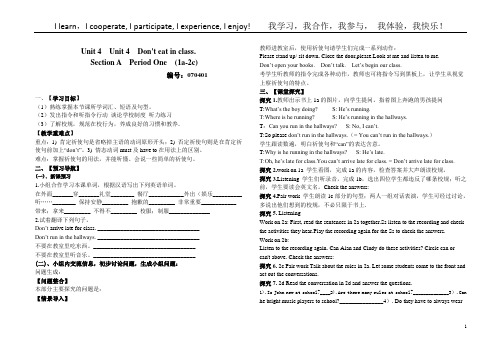
Unit 4 Unit 4 Don't eat in class.Section A Period One (1a-2c)编号:070401一、【学习目标】(1)熟练掌握本节课所学词汇、短语及句型。
(2)发出指令和听指令行动谈论学校制度听力练习(3)了解校规,规范在校行为,养成良好的习惯和教养。
【教学重难点】重点:1) 肯定祈使句是省略掉主语的动词原形开头;2) 否定祈使句则是在肯定祈使句前加上“don’t”。
3) 情态动词must及have to在用法上的区别。
难点:掌握祈使句的用法,并能听懂、会说一些简单的祈使句。
二、【预习导航】(一).新课预习1.小组合作学习本课单词,根据汉语写出下列英语单词。
在外面_______穿_______礼堂________餐厅____________外出(娱乐__________ 听……________保持安静_________抱歉的_________非常重要____________带来;拿来_________不得不_________校服;制服______________2.试着翻译下列句子。
Don’tarrive late forclass.___________________________________Don’t run in the hallways. ___________________________________不要在教室里吃东西。
___________________________________不要在教室里听音乐。
___________________________________(二)、小组内交流信息,初步讨论问题,生成小组问题:问题生成:【问题整合】本部分主要探究的问题是:【情景导入】教师进教室后,使用祈使句请学生们完成一系列动作:Please stand up/ sit down. Close the door,please.Look at me and listen to me.Don’t open your books. Don’t talk. Let’s begin our class.考学生听教师的指令完成各种动作,教师也可将指令写到黑板上,让学生从视觉上察祈使句的特点。
人教版七年级英语下册导学案Unit4Period2SectionA2d3c人教七下
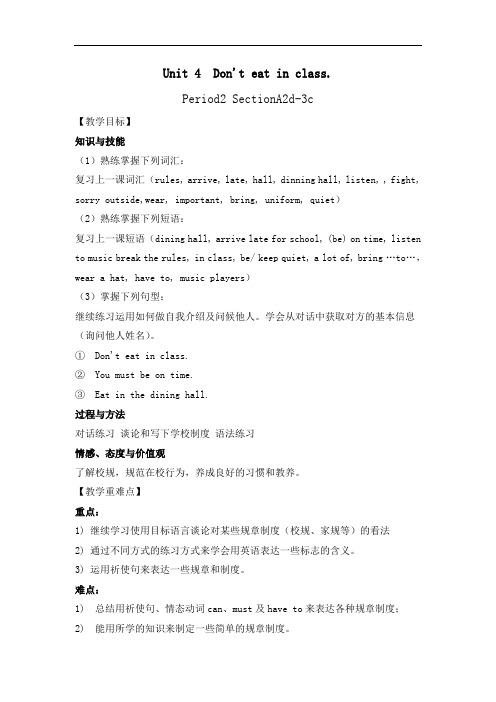
Unit 4 Don't eat in class.Period2 SectionA2d-3c【教学目标】知识与技能(1)熟练掌握下列词汇:复习上一课词汇(rules, arrive, late, hall, dinning hall, listen, , fight, sorry outside,wear, important, bring, uniform, quiet)(2)熟练掌握下列短语:复习上一课短语(dining hall, arrive late for school, (be) on time, listen to music break the rules, in class, be/ keep quiet, a lot of, bring …to…,wear a hat, have to, music players)(3)掌握下列句型:继续练习运用如何做自我介绍及问候他人。
学会从对话中获取对方的基本信息(询问他人姓名)。
① Don't eat in class.② You must be on time.③ Eat in the dining hall.过程与方法对话练习谈论和写下学校制度语法练习情感、态度与价值观了解校规,规范在校行为,养成良好的习惯和教养。
【教学重难点】重点:1) 继续学习使用目标语言谈论对某些规章制度(校规、家规等)的看法2) 通过不同方式的练习方式来学会用英语表达一些标志的含义。
3) 运用祈使句来表达一些规章和制度。
难点:1) 总结用祈使句、情态动词can、must及have to来表达各种规章制度;2) 能用所学的知识来制定一些简单的规章制度。
3) 语法学习,句型转换练习【导学过程】一.新课预习学生阅读Grammar Focus中的句子,然后做填空练习。
① 不要在楼道里跑。
_______________________② 不要打架。
七年级下册英语第四单元导学案(人教版)

(2)Present key sentences with these pictures.Don't arrive late for class.We must be on time.Don't run in the hallways.Don't cat in the classroom.Don,t listen to music in class. Don't fight.(3)Finish la, and then check the answers.Step 3 ListeningListen and finish lb. Check the answers.Step 4 Pair workTalk about the rules in la.知识探究Don't arrive late for class.不要上课迟到。
(1)本句是一个否认的祈使句,祈使句是以动词原形开头的,表示命令或请求的句子。
其否认句是在动词原形之前加don"。
如:Don't do that again.不要再做那样的事情了。
Don't tell our teachers our secrets.不要告诉我们老师我们的。
(2)肯定的祈使句:①句型:动词原形……(省略主语)。
例如:Look at these holes ! 看这些洞。
②有时,为了加强语气,可以在动词之前加do。
例如:Do be quiet.务必安静。
③用客气的语气表示祈使句时,可在句首或句尾加上please,但如果在句尾加please,那么在please之前一定要加上一个逗号(2)表示允许、许可,“可以”、“能"Can the students run in the hallways?学生们可以在走廊上跑吗?We can eat outside.我们可以在外面吃东西。
Can I come in?我能进来吗?问句中,把can放到主语前面,并且没有人称和数的变化, 巩固提升单项选择()1. —What arc the school rules?—We_ listen to music in class.A. don'tB. can'tC. aren't()2. Don't class.A. be lateB. late forC. be late for()3. There are rules in our school.A. a lots ofB. a lot ofC. lot of选择相应的短语补全对话A: We have a lot of rules in our school.B: [A: Don't eat in the classroom. Don't run in the hallways. Don't listen to music in the classroom.2B:3Read the sentences in Grammar Focus and try to remember them by heart.Step 3 Practice(1)Check the answers in 3a. Read the sentences.(2)Check the answers in 3b. Read the sentences.Step 4 ConsolidationMake up five cool rules for a dream school. Vote for the Cook st School.知识探究What do you have to do ?你们必须做什么?have to与其他情态动词一样后接动词原形,表示客观上的需要,强调被迫性,有“不得不”的含义。
新人教版七下英语Unit4新版导学案unit4(Section B 2a-2c )
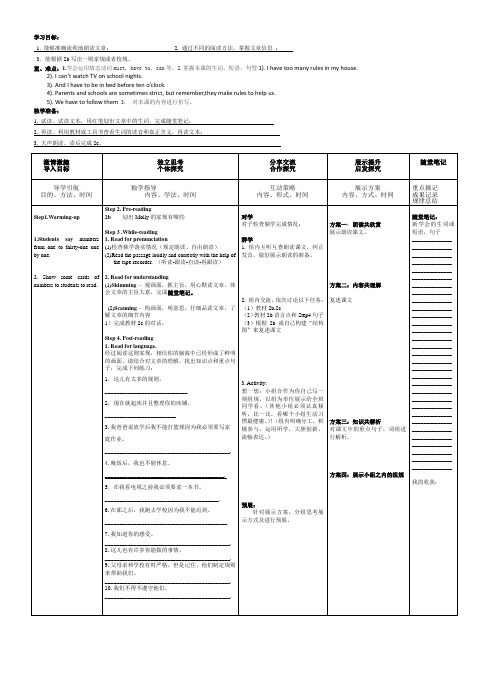
学习目标:1. 能够准确流利地朗读文章;2. 通过不同的阅读方法,掌握文章信息;3.能根据2b写出一则家规或者校规。
重、难点:1.学会运用情态动词must, have to, can等。
2.掌握本课的生词、短语、句型1). I have too many rules in my house.2). I can’t watch TV on school nights.3). And I have to be in bed before t en o’clock.4). Parents and schools are sometimes strict, but remember,they make rules to help us.5). We have to follow them 3. 对本课的内容进行仿写。
独学准备:1. 试读。
试读文本,用红笔划出文章中的生词,完成随堂笔记;2. 再读。
利用教材或工具书查看生词的读音和真正含义,再读文本;3. 大声朗读。
读后完成2c。
当堂测评分层达标基础落实★一.写出下列词组和句子。
1.太多的规定2.不得不3.放学后4.在学校期间的晚上5.整理床铺6.十点之前7.在周末8.打扫房间9.洗衣服10.严格要求某人11.遵守制度能力发展★★二.单项选则( ) 1.I have to get up six the morning.A. at; onB. at; inC. on; inD. on; at ( ) 2.Everyone in our class English very much.A. likeB. likesC. is likeD. liking ( ) 3. On weekends I go to the Children’s Palace the piano.A. to learnB. learnC. learnedD. learns ( ) 4.I have rules in my familyA. too manyB. much tooC. too muchD. many too( ) 5. Did Mary at school late this morning?A. arriveB. getC. arrivedD. go ( ) 6. you pass me the book, please? Yes, I can.A. AreB. DoC. CanD. Does ( ) 7. Don’t too much TV. It’s bad for your eyes.A. watchB. watchedC. watchingD. to watch( ) 8. You go in a hurry(匆忙).There’s enough time left.A. have toB. hadn’tC. don’t have toD. mustn’t( ) 9.Tom fought that boy in a red shirt on the playground just nA. forB. atC. withD. on ( ) 10. –Must I get up early tomorrow? -No, .A. you mustn’tB. I don’t think you have toC. you can’tD. you need三.汉语提示完成句子,每空一词。
七年级英语下册unit4导学案(3,22)人教新课标版
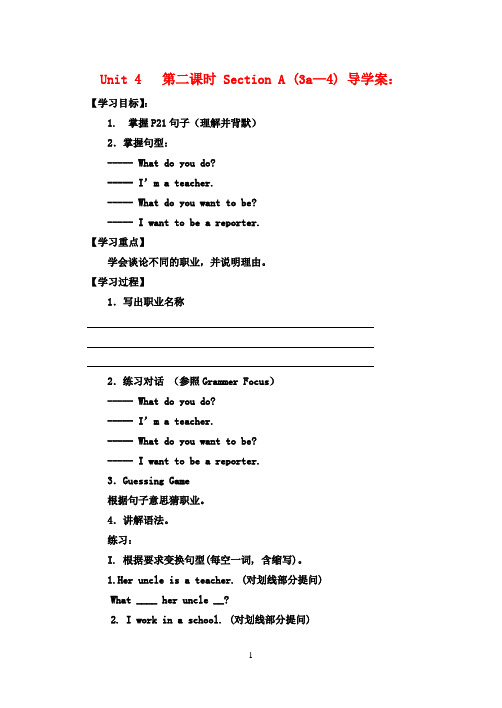
Unit 4 第二课时 Section A (3a—4) 导学案:【学习目标】:1. 掌握P21句子(理解并背默)2.掌握句型:----- What do you do?----- I’m a teacher.----- What do you want to be?----- I want to be a reporter.【学习重点】学会谈论不同的职业,并说明理由。
【学习过程】1.写出职业名称2.练习对话(参照Grammer Focus)----- What do you do?----- I’m a teacher.----- What do you want to be?----- I want to be a reporter.3.Guessing Game根据句子意思猜职业。
4.讲解语法。
练习:I. 根据要求变换句型(每空一词, 含缩写)。
1.Her uncle is a teacher. (对划线部分提问)What ____ her uncle __?2. I work in a school. (对划线部分提问)________ you work?3.Sam wants to be a policeman. (对划线部分提问) _________ Sam ____ to be?Ⅱ. 根据汉语提示用英语完成句子(每空一词)。
1. 你可以从银行取钱。
You can ___ money ____ the bank.2. 他总是穿一件白衬衣。
He always _____ a white shirt.3. 汤姆经常帮助我学英语。
Tom often helps me _______________ English.。
最新】人教版七年级英语下册Unit4全单元4课时导学案

最新】人教版七年级英语下册Unit4全单元4课时导学案段落开始:Unit 4 Don't Eat in ClassIn this unit。
we will learn how to use negative ___ by using "Don't" + the base form of the verb。
For example。
"Don't eat in class." We will also learn some school rules and practice using these words in ___.One ___ to note is that negative imperatives are often used in written language to express ___。
in spoken language。
we can use modal verbs such as "can" or "must" to soften the tone and make the same message ___.Let's discuss the rules we have ___。
We can also work in groups to create class or group rules and come to a consensus on what they should be.By the end of this lesson。
we should have a better understanding of how to use negative imperatives and modal verbs in English。
as well as an ___.Unit 4 Don't Eat in ClassIn the first lesson's homework。
七年级英语人教版下册Unit4_SectionA_词汇学习学法导学案
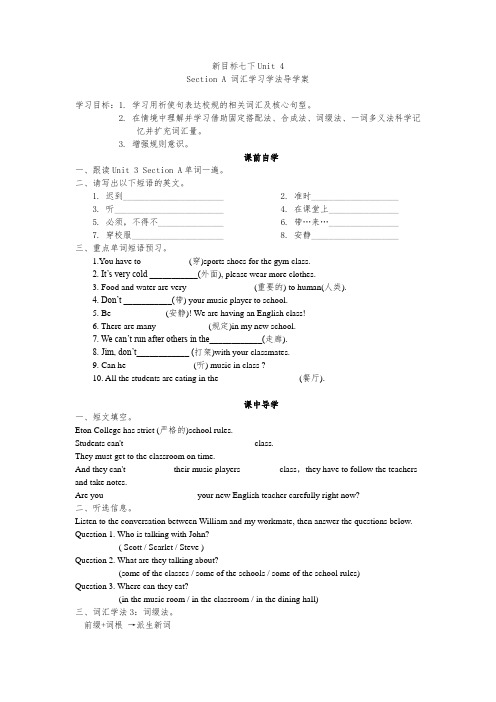
新目标七下Unit 4Section A 词汇学习学法导学案学习目标:1. 学习用祈使句表达校规的相关词汇及核心句型。
2. 在情境中理解并学习借助固定搭配法、合成法、词缀法、一词多义法科学记忆并扩充词汇量。
3. 增强规则意识。
课前自学一、跟读Unit 3 Section A单词一遍。
二、请写出以下短语的英文。
1. 迟到_______________________2. 准时____________________3. 听_________________________4. 在课堂上________________5. 必须,不得不_______________6. 带…来…________________7. 穿校服_____________________ 8. 安静____________________三、重点单词短语预习。
1.You have to __________ (穿)sports shoes for the gym class.2. It’s very cold ___________(外面), please wear more clothes.3. Food and water are very _______________(重要的) to human(人类).4. Don’t ___________(带) your music player to school.5. Be ____________(安静)! We are having an English class!6. There are many____________(规定)in my new school.7. We can’t run after others in the____________(走廊).8. Jim, don’t____________ (打架)with your classmates.9. Can he _______________(听) music in class ?10. All the students are eating in the __________________(餐厅).课中导学一、短文填空。
【人教版】七年级下册英语:Unit4 4-4导学案
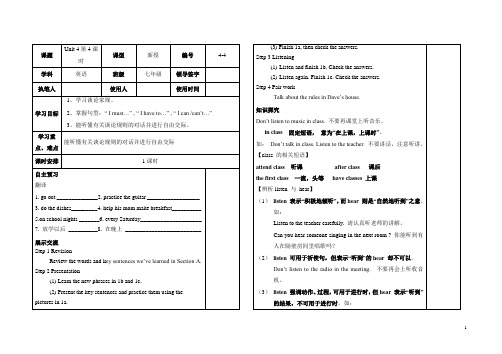
展示交流
Step1 Revision
Review the words and key sentences we’ve learned in Section A.
Step2 Presentation
(1) Learn the new phrases in 1b and 1c.
Listen to the teacher carefully.请认真听老师的讲解。
Can you hear someone singing in the next room ?你能听到有人在隔壁房间里唱歌吗?
(2)listen可用于祈使句,但表示“听到”的hear却不可以。
Don’t listen to the radio in the meeting.不要再会上听收音机。
(2)Listen again. Finish 1c. Check the answers.
Step4 Pair work
Talk about the rules in Dave’s house.
知识探究
Don’t listen to music in class.不要再课堂上听音乐。
in class固定短语,意为“在上课,上课时”。
(3)listen强调动作、过程,可用于进行时,但hear表示“听到”的结果,不可用于进行时。如:
Be quiet, please! I’m listening to the music.请安静,我在听音乐。
巩固提升
()1. Gina often helps her mother ________the dishes.
A. on B. in C. before
七年级英语人教版下导学案:Unit4sectionA(grammar focus 3c)
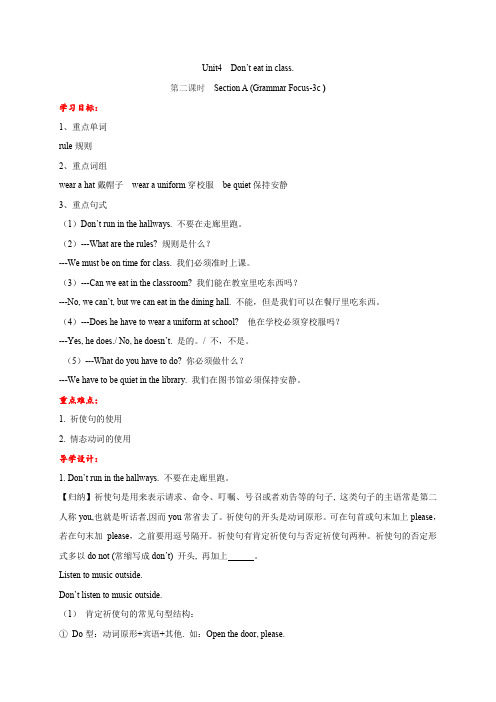
Unit4 Don’t eat in class.第二课时Section A (Grammar Focus-3c )学习目标:1、重点单词rule规则2、重点词组wear a hat戴帽子wear a uniform穿校服be quiet保持安静3、重点句式(1)Don’t run in the hallways. 不要在走廊里跑。
(2)---What are the rules? 规则是什么?---We must be on time for class. 我们必须准时上课。
(3)---Can we eat in the classroom? 我们能在教室里吃东西吗?---No, we can’t, but we can eat in the dining hall. 不能,但是我们可以在餐厅里吃东西。
(4)---Does he have to wear a uniform at school? 他在学校必须穿校服吗?---Yes, he does./ No, he doesn’t. 是的。
/ 不,不是。
(5)---What do you have to do? 你必须做什么?---We have to be quiet in the library. 我们在图书馆必须保持安静。
重点难点:1. 祈使句的使用2. 情态动词的使用导学设计:1. Don’t run in the hallways. 不要在走廊里跑。
【归纳】祈使句是用来表示请求、命令、叮嘱、号召或者劝告等的句子, 这类句子的主语常是第二人称you,也就是听话者,因而you常省去了。
祈使句的开头是动词原形。
可在句首或句末加上please,若在句末加please,之前要用逗号隔开。
祈使句有肯定祈使句与否定祈使句两种。
祈使句的否定形式多以do not (常缩写成don’t) 开头, 再加上。
Listen to music outside.Don’t listen to music outside.(1)肯定祈使句的常见句型结构:①Do型:动词原形+宾语+其他. 如:Open the door, please.②Be型:Be+表语. 如:Be a good boy!③Let型:Let+宾语+动词原形+其他.(或:Let’s+动词原形+其他.) 如:Let me help you.又如:Let’s play tennis.(2)否定祈使句的常见句型结构:①Do型和Be型的否定式:Don’t+动词原形/ be+其他. 如:Don’t forget me. 又如:Don’t be late.②Let型的否定式:Don’t+ let+宾语+动词原形+其他. (或:Let’s+ not+动词原形+其他.) 如:Don’t let him go back. 又如:Let’s not go swimming.③警示语:No+名词/ 动词-ing形式. 如:No talking.2.We must be on time for class.我们必须准时上课。
新人教七年级下册unit 4 导学案
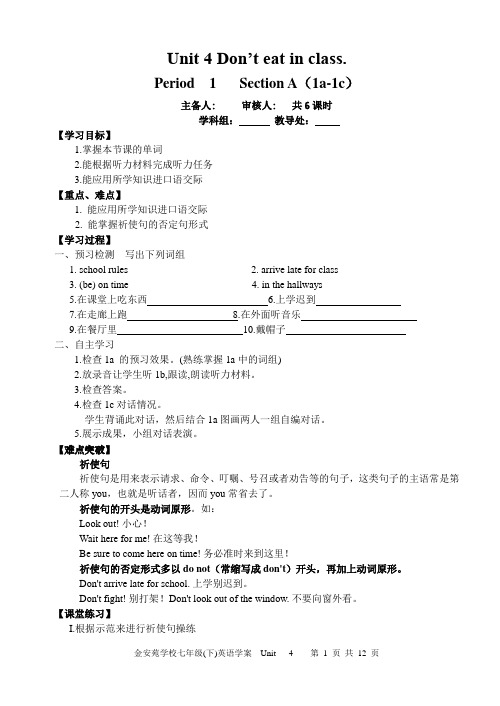
Unit 4 Don’t eat in class.Period 1Section A(1a-1c)主备人: 审核人: 共6课时学科组:教导处:【学习目标】1.掌握本节课的单词2.能根据听力材料完成听力任务3.能应用所学知识进口语交际【重点、难点】1. 能应用所学知识进口语交际2. 能掌握祈使句的否定句形式【学习过程】一、预习检测写出下列词组1. school rules _______________2. arrive late for class _______________3. (be) on time _______________4. in the hallways __________________5.在课堂上吃东西6.上学迟到7.在走廊上跑8.在外面听音乐9.在餐厅里10.戴帽子二、自主学习1.检查1a 的预习效果。
(熟练掌握1a中的词组)2.放录音让学生听1b,跟读,朗读听力材料。
3.检查答案。
4.检查1c对话情况。
学生背诵此对话,然后结合1a图画两人一组自编对话。
5.展示成果,小组对话表演。
【难点突破】祈使句祈使句是用来表示请求、命令、叮嘱、号召或者劝告等的句子,这类句子的主语常是第二人称you,也就是听话者,因而you常省去了。
祈使句的开头是动词原形。
如:Look out! 小心!Wait here for me! 在这等我!Be sure to come here on time! 务必准时来到这里!祈使句的否定形式多以do not(常缩写成don't)开头,再加上动词原形。
Don't arrive late for school. 上学别迟到。
Don't fight! 别打架!Don't look out of the window. 不要向窗外看。
【课堂练习】I.根据示范来进行祈使句操练A: Eat in the class. B: Don’t eat in the class.A: Fight in the classroom. B: .A: Run in the hallways. B: .A: Arrive late for class. B: .A: Listen to music in the classroom.B: .II.用所给动词的适当形式填空1.What about _________(take) a walk ?2.___________(not arrive) late for class.3.He can’t _________(stand) the idea now.4.__________(not read) in the sun.5. _________(not play) on the road. It’s dangerous.【拓展练习】I.单项选择( )1.____ late. It’s your first day to work.A. Don’t to beB. Don’t beC. Don’tD. No ( )2.-______sing! -All right.A. LetB. Let’sC. We letD.No( )3.When will the train ______?A. arriveB. arrive atC. reachD. arrive in( )4.The girl ______ the red dress is Jill Green.A. withB. wearC. put onD. in( )5.-Do you have an eraser? -______. I have _______ eraser.A. No; notB. Not; noC. No; noD. Not; not( )6.Don’t ______ bed by 9 o’clock.A. goB. inC. be inD. go in( )7.We can’t go out _______ school nights.A. atB. inC. onD. by( )8.It’s very warm. You ______ to wear the coat.A. mustB. don’t have toC. have toD. mustn’t( )9.He can’t _______, but he often _______ to the beach and play.A. swimming, goB. swim, goesC. swims, goesD.swim, go ( )10.There are ________ rules in our class.A. many tooB. too muchC. much tooD. too manyII.按要求完成句子:1. Cindy comes to school late everyday. (改为同义句)Cindy everyday..2. Listen to music at home. (改为否定句)to music at home.3. Ruth likes pop music and rock music. (改为否定句)Ruth like pop music rock music.4. We can eat in the dining room. (改为一般疑问句并作肯定回答)eat in the dining room? ,5. We ate fried fish and pizza outside. (就画线部分提问)you fried fish and pizza?6.We can’t listen to music in the classroom.(改为祈使句)to music in the classroom.7.Eat in class,please.(改为否定句)_________ in class,please.8.They have to clean the classroom every day.(对划线部分提问)they have to _________every day.9.Listen to music in the hallways(改否定句)listen to music in the hallways.10.She has to wash clothes every week. (改为一般疑问句)Does she wash her clothes every day.〖总结与反思〗通过本节课的学习,我最大的收获是感到自己有待加强的是教学后记:Period 2Section A(2a---3d)【学习目标】1.学习掌握本节课的生词和短语;2.巩固祈使句的用法;【重点、难点】1.学习情态动词can表示许可的肯定句、否定句、一般疑问句及肯定、否定回答。
人教版七年级英语下册《Unit4Section B2a-2c》导学案
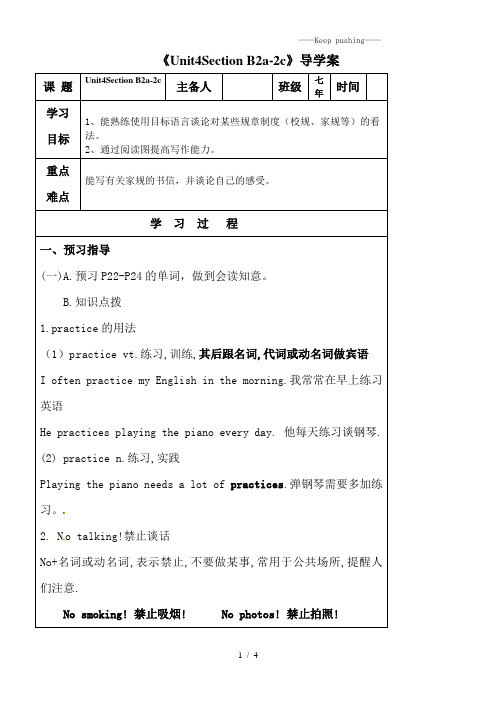
《Unit4Section B2a-2c》导学案课题Unit4Section B2a-2c 主备人班级七年时间学习目标1、能熟练使用目标语言谈论对某些规章制度(校规、家规等)的看法。
2、通过阅读图提高写作能力。
重点难点能写有关家规的书信,并谈论自己的感受。
学习过程一、预习指导(一)A.预习P22-P24的单词,做到会读知意。
B.知识点拨1.practice的用法(1)practice vt.练习,训练,其后跟名词,代词或动名词做宾语I often practice my English in the morning.我常常在早上练习英语He practices playing the piano every day. 他每天练习谈钢琴.(2) practice n.练习,实践Playing the piano needs a lot of practices.弹钢琴需要多加练习。
2. N o talking!禁止谈话No+名词或动名词,表示禁止,不要做某事,常用于公共场所,提醒人们注意.No smoking! 禁止吸烟! No photos! 禁止拍照!No parking! 禁止停车! No swimming! 禁止游泳!No noise! 禁止喧哗!(二)翻译整理床铺_________________ 有太多的规则___________________ 别把脏的餐具留在厨房里___________________________________ 不许喧哗___________________________________晚饭后我也不能休息_______________________________________ 我知道你是什么样的感觉__________________________________ 我们必须遵守他们_________________________________________ 他们制定规则是为了帮助我们_______________________________二、合作探究1.找一找:1)Molly在信中用了哪些词句表示出她的不开心和无奈。
人教版七年级英语下册Unit4 Don’t eat in class!导学案

七年级下册Unit4 Don’t eat in class!导学案Section A班级:姓名:时间:年月日【学习目标】1、掌握10个单词:rule arrive be on time hallway hall dining listen listen tofight sorry outside2、掌握并灵活运用句型:What are the rules ?Don’t do sth. We can(not) do sth We must do/be【学习重难点】1. 祈使句的肯定形式与否定形式2. 句型:What are the rules ? Don’t do sth.We can(not) do sth We must do/be)【预习指导】写出并读出下列单词和短语:1.校规2.迟到3.听音乐4.和他打架5.在走廊里6.在课堂上7.准时 8.在教室里预习课本p19,找出其中的短语和重要句型1 、不要在走廊里跑______________________2、不要上课迟到___________________________3、不要在教室里吃东西___________________4、不要在教室里或走廊里听音乐_____________5、不要打架______________6、你校的规则是什么?________________【合作探究】语法(祈使句)1.)含义:祈使句是用来表示请求、命令、叮嘱、号召或者劝告等的句子,这类句子的主语常是第二人称you,也就是听话者,因而you常省去2.)注意:祈使句的开头是动词原形。
如:过来!快起床!3.)祈使句的否定形式多以do not(常缩写成don't)开头,再加上动词原形。
如:别看电视!别打架!不要说话!学习成果展示一、根据汉语意思完成句子。
1、我们必须准时到校。
We ________ get to school ________ ________.2、不要在走廊上奔跑。
新人教版七年级英语下册Unit4第1课导学案.doc

5 Jack often_________(穿) a uniform in school.
3 We can draw on the wall.(改为否定句)。
We _____ _____on the wall.
4 You can’t take photos in thelibrary.(改为祈使句)。
_______ _______photos in thelibrary
5.Open the window, please. (改为否定祈使句).
B:We can’t arrive late for class. B:_________________________________________
We must be on time .__________________________________________
任务四:知识梳理
1.Listento music .Don’teatin the classroom .这两个句子为祈使句。祈使句是表示请求、命令、建议等语气的句子。祈使句中通常省略第二人称主语you,肯定形式以_______词原形开头,否定句式在动词前加_________.(常在句首或句尾加please表示礼貌)
A Where B Who C What D When
( )2Don’t ______ in the classrooms.
A fighting B fights C fought D fight
( )3.Please______late for class .
Aisn’tBaren’tCdonFra bibliotekt beDnot
Be __________(准时)。
(完整word版)新人教版七年级英语下册第四单元导学案
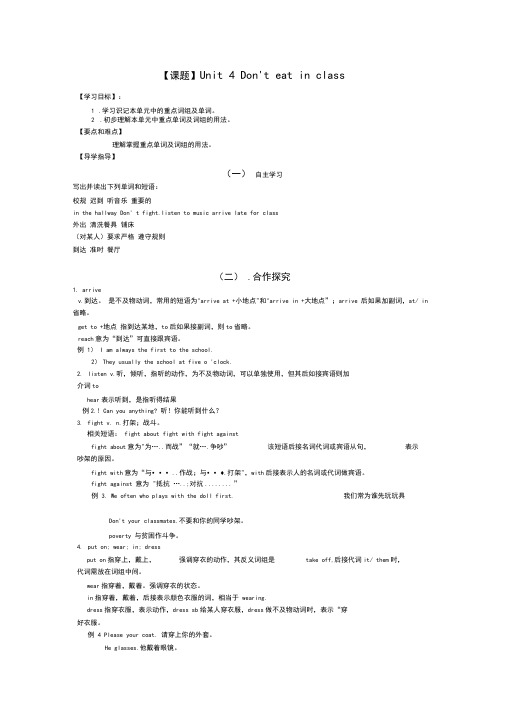
【课题】Unit 4 Don't eat in class【学习目标】:1.学习识记本单元中的重点词组及单词。
2.初步理解本单元中重点单词及词组的用法。
【要点和难点】理解掌握重点单词及词组的用法。
【导学指导】(一)自主学习写出并读出下列单词和短语:校规迟到听音乐重要的in the hallway Don' t fight.listen to music arrive late for class外出清洗餐具铺床(对某人)要求严格遵守规则到达准时餐厅(二).合作探究1. arrivev.到达。
是不及物动词,常用的短语为"arrive at +小地点"和"arrive in +大地点”;arrive 后如果加副词,at/ in 省略。
get to +地点指到达某地,to后如果接副词,则to省略。
reach意为“到达”可直接跟宾语。
例1) I am always the first to the school.2)They usually the school at five o 'clock.2.listen v.听,倾听,指听的动作,为不及物动词,可以单独使用,但其后如接宾语则加介词tohear表示听到,是指听得结果例2.! Can you anything? 听!你能听到什么?3.fight v. n.打架;战斗。
相关短语:fight about fight with fight againstfight about意为"为…..而战”“就….争吵”该短语后接名词代词或宾语从句,表示吵架的原因。
fight with意为“与•••..作战;与••♦.打架",with后接表示人的名词或代词做宾语。
fight against 意为 "抵抗…..;对抗........ ”例 3. We often who plays with the doll first. 我们常为谁先玩玩具Don't your classmates.不要和你的同学吵架。
- 1、下载文档前请自行甄别文档内容的完整性,平台不提供额外的编辑、内容补充、找答案等附加服务。
- 2、"仅部分预览"的文档,不可在线预览部分如存在完整性等问题,可反馈申请退款(可完整预览的文档不适用该条件!)。
- 3、如文档侵犯您的权益,请联系客服反馈,我们会尽快为您处理(人工客服工作时间:9:00-18:30)。
【课题】Unit 4 Don’t eat in class【学习目标】:1.学习识记本单元中的重点词组及单词。
2.初步理解本单元中重点单词及词组的用法。
【要点和难点】理解掌握重点单词及词组的用法。
【导学指导】(一)自主学习写出并读出下列单词和短语:校规迟到听音乐重要的in the hallway Don’t fight. listen to music arrive late for class外出______________清洗餐具____________ 铺床_______________(对某人)要求严格___________________ 遵守规则_____________________到达_________ 准时____________餐厅_________________(二). 合作探究1. arrivev. 到达。
是不及物动词,常用的短语为“arrive at +小地点”和“arrive in +大地点”;arrive 后如果加副词,at/ in 省略。
get to +地点指到达某地,to 后如果接副词,则to 省略。
reach 意为“到达”可直接跟宾语。
例1)I am always the first to ________ _________ the school.2) They usually ________the school at five o’clock.2. listen v. 听,倾听,指听的动作,为不及物动词,可以单独使用,但其后如接宾语则加介词tohear 表示听到,是指听得结果例2. __________! Can you ________ anything? 听!你能听到什么?3. fight v. n. 打架;战斗。
相关短语:fight about fight with fight againstfight about 意为“为…..而战”“就….争吵”该短语后接名词代词或宾语从句,表示吵架的原因。
fight with 意为“与…..作战;与….打架”,with 后接表示人的名词或代词做宾语。
fight against 意为“抵抗…..;对抗……”例3. We often _________ __________ who plays with the doll first. 我们常为谁先玩玩具娃娃而争吵。
Don’t ________ ________ your classmates. 不要和你的同学吵架。
_________ __________ poverty 与贫困作斗争。
4. put on; wear; in; dressput on 指穿上,戴上,强调穿衣的动作,其反义词组是take off, 后接代词it/ them 时,代词需放在词组中间。
wear 指穿着,戴着。
强调穿衣的状态。
in 指穿着,戴着,后接表示颜色衣服的词,相当于wearing.dress 指穿衣服,表示动作,dress sb 给某人穿衣服,dress 做不及物动词时,表示“穿好衣服。
例4 Please ____________ __________ your coat. 请穿上你的外套。
He _________glasses. 他戴着眼镜。
The boy ______ red coat is my brother. 穿红色外套的男孩是我的弟弟。
Get up and __________ quickly. 起来快穿好衣服。
【课堂练习】(一) 基础达标A) 根据句意及首字母提示完成单词。
1. Don’t break r______in the school library.2. Nick is very friendly to everyone. He never f_______.3. It’s time for lunch. Let’s go to the d_______ hall.4. Don’t run in the h_______. It’s a little dangerous.5. We often have our PE class in the g when it rains.6. Every Sunday our mother w__________ the clothes of all the family.8. Don’t stay o___________. It’s too cold. Come in!9. Dogs like to bark(吠叫) ____________(大声的)if there is a stranger(陌生人).10. They came back from Beijing two days l .(二)巩固提升B) 用所给单词的适当形式完成句子。
1. Can those students _______ (have) lunch at home?2. Look at the sign(标志) on the wall! It says “No _________ (swim)!”3. __________ (do) your homework and don’t watch TV.4. Boys and girls all need to wear sports ________(shoe) for gym class.5. On (child) Day, we played a lot of games and (have) much fun.6. Please practice (play) the guitar every day.7. I’m so tired. Let’s stop (write) and take a rest.8. He (find) boy (cry)last Sunday.9. Don’t talk ____________(loud) in the meeting room【课题】Unit 4 Don’t eat in class【学习目标】:1. 学习section B 部分的课文。
2. 理解课文中信件的内容。
3. 学会写有关规则的文章及复习如何写一封信。
【要点和难点】学会写有关规则的文章及复习如何写一封信。
【导学指导】(一)自主学习预习课文,用have to, must 及can 和can’t 填空。
1.Molly ______________ play basketball on school days, but she __________ play it onweekends.2.Molly ___________ do her homework first when she gets home.3.Molly __________ read a book after dinner before she ___________ watch TV.4.At school, Molly ____________ be noisy or eat in class.5.Parents and schools make rules to help students. So students___________ follow the rules.(二). 合作探究1. There are too many rules! 有太多的规定。
too many 意为太多的。
其中心词是many,too 修饰many 以加强语气,too many用来修饰可数名词复数。
too much意为太多的。
其中心词是much,too 修饰much 以加强语气,too much用来修饰不可数名词。
much too 意为非常,太。
是副词性短语,中心词是too, much 修饰too 以加强语气。
much too 用以修饰形容词或副词。
例1. I have ________ __________questions to ask.There is _________ __________ rain in the south.This dress is _________ _________ expensive.2. At school, we have more rules…在学校,我们有更多的规定….more 在此是many 的比较级,意为更多的。
它还有“又,再,别的,额外的”意思,常放在some, a little, a few, a lot 以及数词的后面。
“名词+more”表示“再来….”。
例2. I want to stay here for five___________ days. 翻译:____________________________ Please give her some ____________. 翻译:________________________________.3. Parents and schools are sometimes strict…父母和学校有时是严格的…sometimes 是副词,意为有时,相当于at times, 一般位于系动词,助动词,情态动词之后,实义动词之前,也可放于句首。
some times 意为几次,几倍。
some time 意为一段时间。
例3. ____________ she is happy ; ___________ is sad.I have been to Beijing ________ ___________.Don’t worry! There is _______ _______ left.4. …, and I have to keep my hair short…., 而且我必须留短发。
keep 意为保持,后接形容词,“keep + 名词+ 形容词”指“保持某种状态”。
keep + 宾语+ v. ing 指“使…保持某种状态”。
keep doing sth 或keep on doing sth 继续(一直,老是,反复)做某事。
例4. I’m sorry to ________ you waiting.They decided to ________ trying.【课堂练习】(一) 基础达标1.-Why are you walking so fast? Because I get home to do my work.A. haveB. go toC. have toD. has to2. You go in a hurry(匆忙).There’s enough time left.A. have toB. hadn’tC. don’t have toD. mustn’t3.Sorry, I can’t it in English. I can only Chinese.A. speak, talkB. say, tellC. say, speakD. talk, say4.-Can you cook dinner? . It’s easy.A. No, I can’tB. Yes, I canC. No, I canD. Yes, I need(二)巩固提升根据句意及首字母提示补全单词1.My mother asked me to do the d_________ after dinner yesterday evening.2.We can’t go out on school n___________.3.We must go to bed b_________ ten o’clock in the evening.4.It’s n_________ in the classroom. Please don’t talk.5.The students should do some r_______ in the morning.6.My parents are s_________ with me.7.We must f__________ these rules.8.R__________ to wait for me at the school gate tomorrow morning.【课题】Unit 4 Don’t eat in class【学习目标】:1. 复习本单元的重点词汇及短语。
